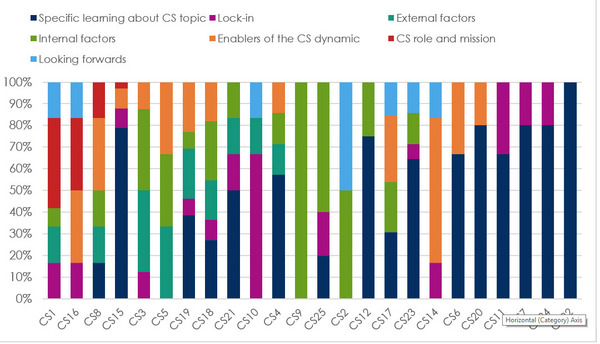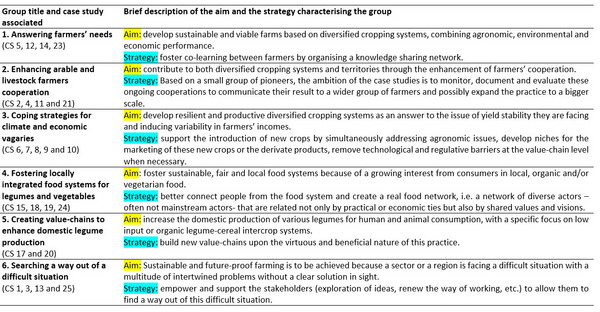In spring 2020, in the context of the performance assessment of crop diversification activities carried out in real operative contexts, the case studies evaluated their progress by developing a Learning History. A Learning History is a historical timeline written collectively and providing information in terms of issues such as learning, decisions, changes in network, attitudes.
The Learning Histories were analysed by the team of DiverIMPACTS work package 2 (Promoting crop diversification in case studies through actor-oriented research), both at the individual level and across the case studies. Learning activities and the overall strategies were scrutinised. In summary:
- Lessons learned by the case studies were classified into seven learning categories. The findings illustrated a rich diversity in the combination of categories or ‘learning profiles’ across the case studies (Figure 1)
- The analysis of the activities reported by the case studies showed that the teams have been versatile in working towards their goals and ambitions (Figure 2). The accounts reveal that most cases have developed past the novelty stage and have begun impacting the agricultural sector at a regional level, further instigating the societal change process.
- The analysis of the case studies’ turning points and the adjustments of strategies highlight that the cases are going through the cycles of doing and reflecting that are engrained in the monitoring tools and co-innovation workshops. This enabled the case studies to successfully re-adjust their strategy with their mission in mind.
- Finally, using the plant/probe/push/pull framework (Wigboldus & Leeuwis, 2013), we illustrated that the case studies were very diverse in the way they were generating change.
These accounts can serve as resources that will inspire the case studies and help them think outside the box and make more conscious strategic decisions in creative situations. More precisely, we experimented that enabling such greater responsiveness to change may be achieved by more actively sharing detailed accounts of case study experiences, as evidenced by the feedback from the webinar held on October 6 2020. Marian Blom, leader of the Dutch case study “Multi-cropping for vegetable production in short supply chains” used as an example during this webinar, testified: “As Yvonne guided me through the reflection document that the work package 2 team made for our case study, the words and graphs came to life. She explained why our case study was ranked or characterised in a certain way and made comparisons with other case studies she scrutinised. The conversation gave me more insight into the different trajectories that we followed for the different problems we set ourselves to work on in the case study. And maybe most importantly, I got an outlook and inspiration for several options to explore in the last part of this project”.
The work package 2 team is now working on providing similar support to each case study requesting it. The intention is to help the teams to better understand their own case study and to gain insight into how others utilise key enablers and innovations that remove existing barriers and ensure uptake of benefits of crop diversification at the farm, value chain and territory levels.
Building on these results, the work package 2 team is striving to find commonalities among the case studies in the direction of transformative change. The result is a new grouping of case studies based on strategic similarities, problems and/or agronomic objects (Table 1). We hope that this new clustering will further enhance reflexivity and learning in the DiverIMPACTS project and provide a basis for future exchanges between the case studies. More precisely, the identified directions of transformative change will be a central topic of discussion during the next DiverIMPACTS Annual Meeting, which will take place in December 2020.
Further information
Links
Online seminar of October 6, 2020: Learning Histories: looking back to look forward (presentation + recording)
Reference
Wigboldus, S., & Leeuwis, C. (2013). Towards responsible scaling up and out in agricultural development. An exploration of concepts and principles. Centre for Development Innovation Discussion Paper, September 2013, 65. https://www.wur.nl/en/Publication-details.htm?publicationId=publication-way-343439393433






 tap and then scroll down to the Add to Home Screen command.
tap and then scroll down to the Add to Home Screen command.